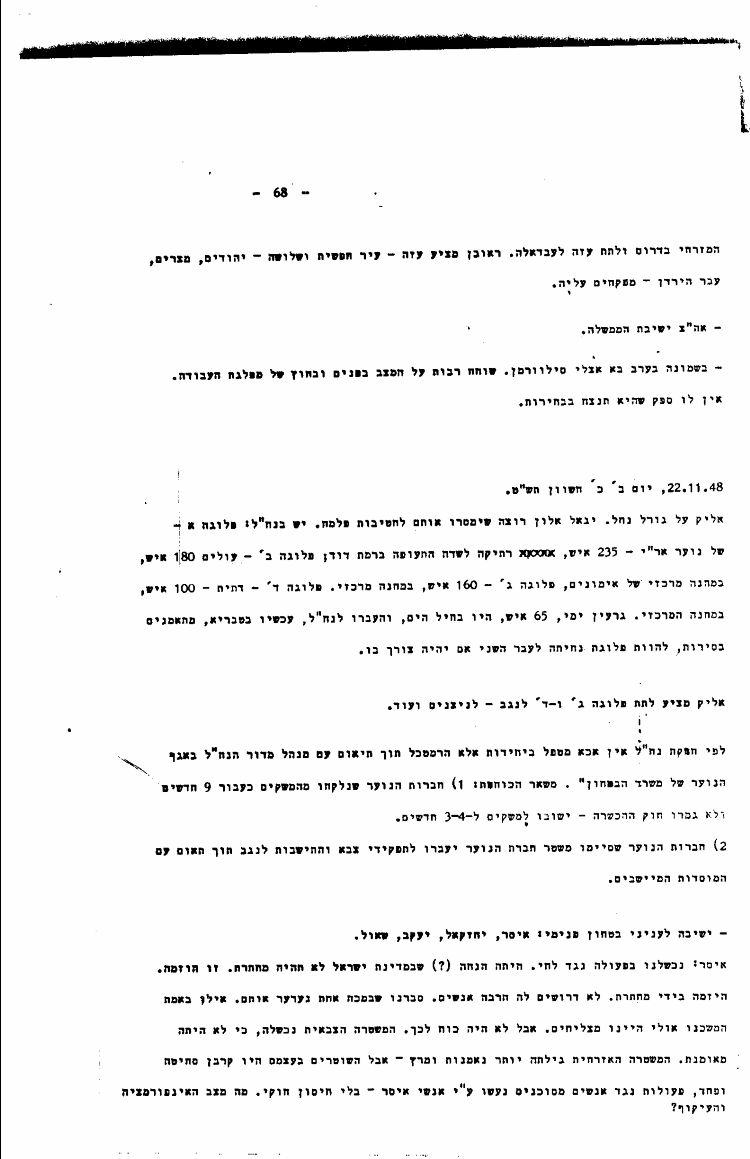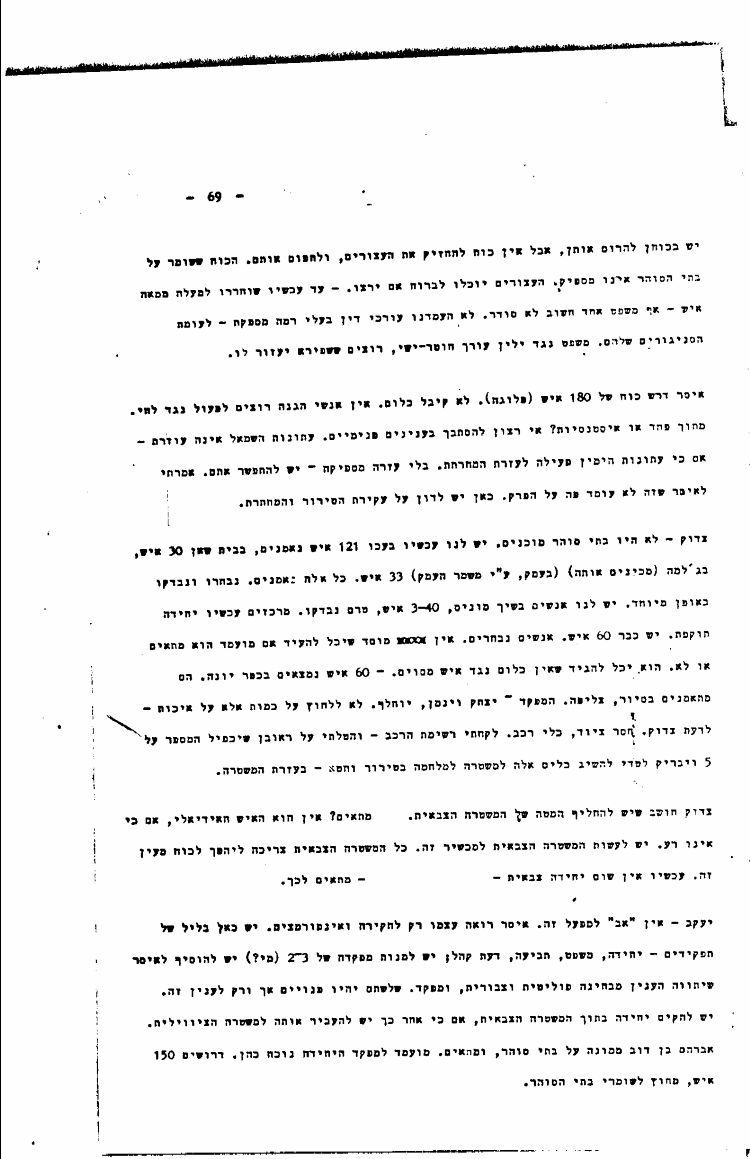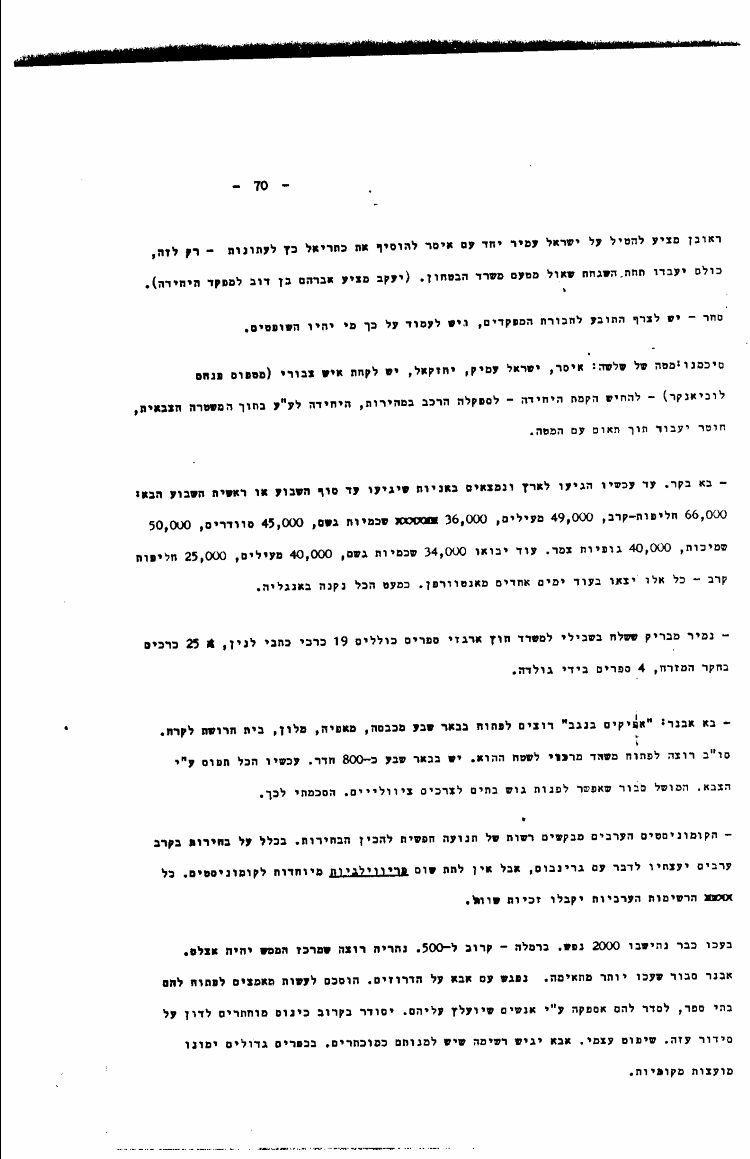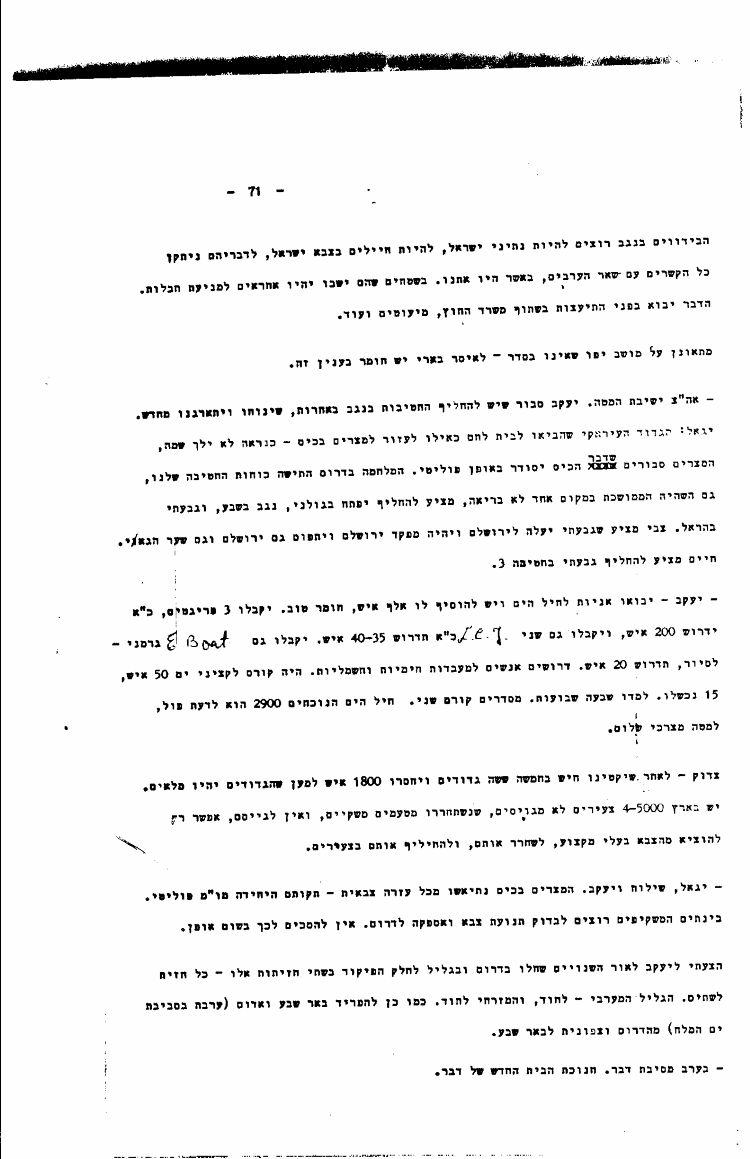1
of
Places:
England
Antwerpen
Bet She'an
Dor
Nitsanim
Ramat David
Acre
Kfar Yona
Mishmar Ha'Emek
Amir
Afikim
Nayn
Be'er Sheva
Be'eri
Jaffa
Nahariya
Ramla
Gaza
Bethlehem
Geva
Yiftah̠
Egypt
Giv'ati
Har'el
Tverya
Magen
Moscow
Jerusalem
Dead Sea
The use of the photograph is subject to the Copyright Law, 2007
22.11.1948
225139
Monday, November 22, 1948 Elik [Shomroni] on the fate of NAHAL [No’ar Halutzi Lohem – Pioneer Fighting Youth, a combined military service and agricultural settlement program]. Yigal Allon wants to have them transferred to Palmach brigades. NAHAL has: Company A – consisting of Eretz-Israeli youth – 235 men, confined to the airfield at Ramat David; Company B – immigrants, 180 men, at a central training camp [Mahane 80 (Camp 80), near Pardes Hannah]. Company C – 160 men, at the central camp. Company D – religious – 100 men, at the central camp. A naval core group, 65 men, were in the Navy, and were transferred to NAHAL, now in Tiberias, training with boats, to form an incursion company for landings on the other side [of the Sea of Galilee] if necessary. Elik proposes giving Company C and D to the Negev – for Nitzanim and elsewhere. Under the NAHAL constitution, the chief of staff rather than the Personnel Department handles the units, in coordination with the director of the NAHAL administration in the Defense Ministry’s Youth Department. Of the other forces: 1) The youth groups that were taken from the settlements after nine months who haven’t completed the Training Law [requirements] – will be returned to the settlements for 3-4 months. 2) The youth groups that completed the youth group regime will be assigned to positions in the army and settlement in the Negev, in coordination with the settlement institutions. – A meeting on internal security matters: Isser [Harel], Yehezkel [Sahar], Ya’akov [Dori], Shaul [Avigur]. Isser: We failed in the operation against LEHI. It was assumed (?) that the State of Israel would not have an underground. This was refuted. The initiative lies with the underground. It doesn’t require many people. We thought that we would disrupt them with one blow. Maybe if we’d really continued, we would have succeeded. But we didn’t have the force to do this. The military police failed, because it wasn’t trained. The civilian police demonstrated more loyalty and vigor – but the policemen themselves were victims of extortion and fear. Actions against dangerous individuals were carried out by Isser’s people – without legal immunity. What’s the state of information and surveillance? They have the potential to destroy them, but not enough force to hold the detainees – or to capture them. The force guarding the prisons is insufficient. The detainees can escape if they want to. So far more than 100 individuals have been released – not a single important trial has been arranged. We haven’t assigned lawyers of sufficient caliber – compared with their defense attorneys. The prosecution of Yellin[-Mor] is being conducted by [Aharon] Hoter-Yishai, [and] they want to have [Shimon] Shapira help him. Isser requested a force of 180 men (a company). Received nothing. Haganah men do not want to take action against LEHI. Out of fear or squeamishness? Because they don’t want to become embroiled in internal matters. The left-wing press is not helping – even though the right-wing press is active in helping the underground. Without enough support – [we’ll] have to reach a compromise with them. I told Isser that this is out of the question. The discussion needs to be about uprooting terrorism and the underground. [Moshe] Zadok – there weren’t readily available prisons. Now we have 121 loyal men [at the prison] in Acre, 30 men in Bet She’an, in Jalame (which is being prepared) and in the Valley (near Mishmar HaEmek) 33 men. All of them are loyal. They were specially selected and vetted. We have men in Sheikh Munis, 30-40 men, not yet vetted. An assault unit is being formed. It already has 60 men. Select men. There’s no institution that can attest whether a candidate is suitable or not. It can [only] say that there’s nothing against a particular person. 60 men are in Kefar Yona. They’re undergoing training in reconnaissance and marksmanship. The commander – Yitzhak Wyman [sp.] – will be replaced. In Zadok’s view – quality rather than quantity should be emphasized. Equipment, vehicles are lacking. I took the list of vehicles – and tasked Reuven [Shiloah] with multiplying the number by 5 and telegraphing Teddy [Kollek] to obtain these vehicles for the [special] police for terrorism and criminal offense – with the help of the police. Zadok thinks that the military police staff should be replaced. Is [Daniel] Magen suitable? He isn’t the ideal person, though he’s not bad. The military police should be turned into this instrument. The entire military police needs to be transformed into a force of this sort. Right now there’s no military unit – neither Harel nor Yiftah – that’s suitable for this. Ya’akov – there’s no “father” for this enterprise. Isser sees himself as only [in charge of] investigation and information. There’s a mix of roles here – [the] unit, trial, prosecution, public opinion. Need to appoint a headquarters of 2-3 (who?). In addition to Isser [we] need to appoint [someone] to steer the issue in terms of politics and the public, and a commander. All three will be available only for this issue. A unit needs to be established within the military police, although afterwards it should be transferred to the civilian police. Avraham Ben-Dov is in charge of prisons, and is suitable. The candidate for commander of the unit is Noah Cohen. 150 men are required, aside from the prison guards. Reuven proposes tasking Yisrael Amir along with Isser. Adding Katriel Katz for the press – and only for that. All of them will work under the supervision of Shaul [Avigur] on behalf of the Defense Ministry (Ya’akov proposes Avraham Ben-Dov as unit commander). Sahar – the prosecutor should be added to the group of commanders, and emphasis should be placed on who the judges are. We concluded: A staff of three: Isser, Yisrael Amir, Yehezkel [Sahar]. A public figure (along the lines of Pinhas Lubianker [Lavon]) should be assigned – to speed up the formation of the unit – to provide for its composition quickly. For now the unit is within the military police. Hoter[-Yishai] will work in coordination with the staff. – [Aharon] Becker came. So far [the following] have arrived in the country or are on ships that will arrive by the weekend or the start of next week: 66,000 combat uniforms, 49,000 coats, 36,000 raincoats, 45,000 sweaters, 50,000 blankets, 40,000 cotton undershirts. Also due to arrive are 34,000 raincoats, 40,000 coats, 25,000 combat uniforms – all these will be sent within a few days from Antwerp. Nearly everything was bought in England. – [Mordechai] Namir [advisor to the embassy in Moscow] cables that he sent a box of books for me to the Foreign Ministry, including 19 volumes of Lenin’s writings, 2 volumes of scholarship on the East. 4 books via Golda. – Avner [the military governor] came: Afikim BaNegev [a company for the development of Beersheva] want to open a laundromat, bakery, hotel, [and] ice factory in Beersheva. Solel Boneh [a cooperative labor company for public works, construction, and industry] wants to open a central office for that area. There are about 800 rooms in Beersheva. Right now everything is taken by the army. The governor believes it’s possible to clear out a group of houses for civilian purposes. I agreed to this. The Arab Communists are requesting freedom of movement to prepare for the elections. [We spoke] generally about elections among the Arabs. I advised [that Avner] speak with [Minister of the Interior] Gruenbaum, but no special privileges should be granted to the Communists. All the Arab parties will be granted equal rights. 2,000 persons have already settled in Acre; in Ramle – close to 500. Nahariya wants to have the [military] government there. Avner believes that Acre is more suitable. He met with Abba [Khoushy] regarding the Druze. It was agreed that efforts would be made to open schools for them, to arrange supplies for them by people who will be recommended. Soon a gathering of mukhtars will be convened to discuss the community’s organization, judicial self-governance. Abba [Khoushy] will provide a list [of candidates] to be appointed as mukhtars. In the large villages local councils will be appointed. The Bedouin in the Negev want to be subjects of Israel, to be soldiers in the Israeli army. According to them, they cut all ties with the other Arabs, since they were with us. In the areas where they reside, they’ll be responsible for preventing acts of sabotage. The matter will be submitted for consultation with the participation of the Ministries of Foreign Affairs, Minorities, and others. He complains about the Jaffa governor not being acceptable – Isser Be’eri has material on this matter. – In the afternoon [General] Staff meeting. Ya’akov [Dori] thinks that the brigades in the Negev should be replaced with others, to rest and reorganize. Yigael [Yadin]: The Iraqi battalion that was brought to Bethlehem seemingly to assist the Egyptians in the “pocket” – apparently won’t go there. The Egyptians think that the matter of the “pocket” will be resolved politically. The fighting in the south has exhausted our brigade forces, and the long stay in one place isn’t healthy either; he proposes replacing Yiftah with Golani, Negev with Seven, and Givati with Harel. Zvi [Ayalon] proposes that Givati [Shimon Avidan] go to Jerusalem and become the Jerusalem commander and capture both Jerusalem and Sha’ar HaGai. Haim [Laskov] proposes replacing Givati with the 3rd Brigade [Alexandroni]. Ya’akov – the Navy will be receiving ships, and it should be increased by a thousand men of good quality. They’ll receive 3 frigates, each requiring 200 men. They’ll also received two LCI [landing craft, infantry] each requiring 35-40 men. They’ll also receive a German E-Boat [torpedo boat] – for reconnaissance – requiring 20 men. Personnel are required for chemical and electrical laboratories. There was a course for naval officers – 50 men, 15 failed. They studied for seven weeks. A second course is being organized. The current Navy [manpower] of 2,900 is, in Paul [Shulman]’s view, below the peacetime needs. Zadok – after Hayish [Haganah Field Corps] is reduced by 5-6 battalions, there will be a shortfall of 1,800 men in order for the battalions to be full. There are 400-500 young men in the country who haven’t been conscripted, who were released for economic reasons, and are not to be conscripted. Only people with occupations can be pulled out of the army, released, and replaced with young people. Yigael [Yadin], [Reuven] Shiloah, and Ya’akov [Dori]: The Egyptians in the “pocket” have despaired of any military assistance – their only hope is political negotiations. In the meantime the [UN] observers want to check the army’s movement and supplies to the south. This should not be agreed to under any circumstances. I proposed to Ya’akov, in light of the changes that have taken place in the south and in the Galilee, that the command at these two fronts be divided – each front into two [into “districts” – evidently]. The Western Galilee – separate, and the Eastern separate. Likewise to separate Beersheva and Edom (the ‘Arava desert and Dead Sea area) from the south, north of Beersheva. – In the evening a Davar reception. Inauguration of Davar’s new building [on Sheinkin Street in Tel Aviv.












